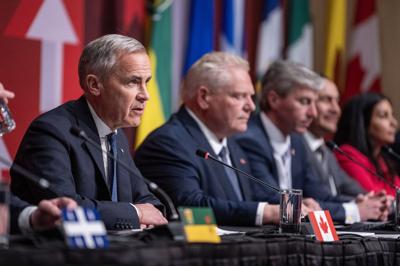A bucolic resort in Muskoka is the political centre of Canada this week.
Canada’s premiers are gathering in cottage country to meet with Indigenous leaders Monday afternoon and Prime Minister Mark Carney on Tuesday morning before the official start of their Council of the Federation meeting later that day.
In an unusual move, Premier Doug Ford, who is hosting the summit at Huntsville’s Deerhurst Resort on Peninsula Lake, invited Carney to attend the provincial and territorial leaders’ conference because of U.S. President Donald Trump’s trade war against Canada.
“It’s never been a more important time to welcome my fellow premiers to Ontario to continue the work we’ve done over the past year to protect Canada and our economy,” Ford said Thursday in ÎÚÑ»´«Ã½.
Tariffs and treaty rights are on the agenda as the country's premiers arrive in Ontario's cottage country for a three-day meeting that comes at a pivotal time for both Canada-U.S. and domestic relations. (July 20, 2025)
The Canadian Press“This meeting will be an opportunity to work together on how to respond to President Trump’s latest threat and how we can unleash the full potential of Canada’s economy,” added the Progressive Conservative premier, a close political ally of the Liberal prime minister.
Carney was quick to accept Ford’s invitation and emphasized he has other things to discuss with the premiers, including “bail reform, particularly with respect to repeat offenders,” among other criminal justice matters.
“We have commitments on that. We’re working with the provinces on those issues,” the prime minister said Wednesday in Hamilton.
“I’ll be meeting with the premiers next week. I’m sure that’s one of the elements that we will discuss, and you can expect legislation from this government in the fall,” he said.
That’s music to Ford’s ears — for years he has been urging Ottawa to toughen up bail laws to prevent “weak-kneed judges” from releasing recidivists.
But the primary focus of the Muskoka meetings will be the economy — especially in light of Carney’s admission last week that any future deal with Trump would likely mean tariffs on Canadian goods exported stateside.
“There’s not a lot of evidence right now from the deals, agreements and negotiations with the Americans, for any country or any jurisdiction, to have a deal without tariffs,” the prime minister conceded last Tuesday.
Monday’s session with the premiers and Indigenous leaders is expected to be dominated by many First Nations’ opposition to Ford’s Bill 5, the Protect Ontario by Unleashing our Economy Act, and Carney’s Bill C-5, the One Canadian Economy Act.
The federal and provincial laws, which are designed to speed up major infrastructure projects like pipelines and rail corridors as well as mines, have raised questions about traditional treaty rights and the environmental impact of fast-tracking development.
Assembly of First Nations National Chief Cindy Woodhouse Nepinak has warned that “our rights cannot be implemented or respected without us, in substance and in process.”
Still, Carney insisted at a Gatineau meeting Thursday with First Nations leaders — where fears about Bill C-5 were expressed — that “in many respects, this is the first federal legislation to put Indigenous economic growth at its core.”
Ford, meanwhile, is devoting some of his summer to allaying Indigenous communities’ concerns over Bill 5, which he hopes will speed up development of the Ring of Fire mining project.
But legal challenges against both bills are being launched by nine Ontario First Nations, arguing the laws are unconstitutional. They are seeking a court injunction that would prevent Ottawa and Queen’s Park from moving so quickly.
One aspect of Bill C-5 that is less contentious is the removal of most federal barriers to interprovincial trade.
Because Trump’s actions are forcing Canadian leaders to scramble to diversify trade, there has been a push to eliminate internal barriers that could cost the Canadian economy as much as $200 billion annually.
Ontario has so far inked deals with all provinces except Quebec, British Columbia and Newfoundland and Labrador to curb hurdles to free trade within Canada.
Sources, speaking confidentially in order to discuss internal deliberations, say an accord with B.C. will be signed in Huntsville, putting more pressure on Quebec’s François Legault and Newfoundland and Labrador’s John Hogan to reach agreements with Ford.
B.C. New Democratic Premier David Eby told reporters Thursday in Victoria that his province will be “seizing new opportunities” to reduce its reliance on trade with the U.S.
Officials say Ford is also expected to sign memorandums of understanding with the territorial premiers of Yukon, Northwest Territories and Nunavut.
The three-day meeting is being held about 40 minutes drive from the premier’s family cottage.
Error! Sorry, there was an error processing your request.
There was a problem with the recaptcha. Please try again.
You may unsubscribe at any time. By signing up, you agree to our and . This site is protected by reCAPTCHA and the Google and apply.
Want more of the latest from us? Sign up for more at our newsletter page.




























To join the conversation set a first and last name in your user profile.
Sign in or register for free to join the Conversation